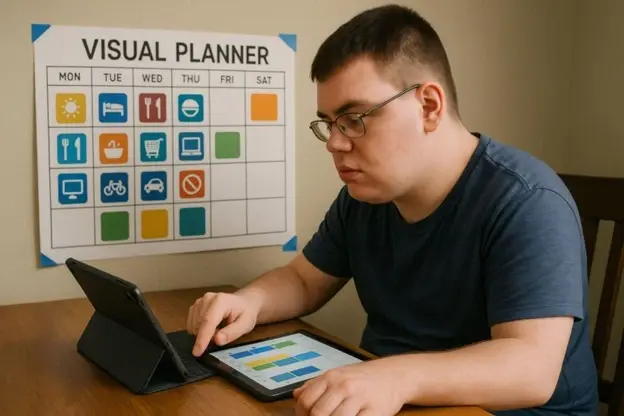Supporting Your Child with Autism: Practical Tips for Everyday Challenges
August 8, 2025

Introduction
Raising a child with autism can feel like a rollercoaster—some days are filled with progress, others with meltdowns or sleepless nights. Whether you’re a single mom juggling multiple kids or a grandparent stepping in to care, challenges like sensory sensitivities, communication struggles, or disruptive behaviors can leave you overwhelmed. This guide offers practical, parent-tested strategies to navigate autism’s unique challenges, build your child’s confidence, and create moments of connection.
Why Autism Challenges Happen
Autism affects how kids process information, often leading to difficulties with communication, sensory input, or adapting to change. A 5-year-old might cry frequently due to sensory overload, while a 19-year-old functioning at a younger developmental level may need constant supervision. These behaviors don’t reflect a lack of ability—they’re signs your child needs tailored support to shine in their own way.

The Importance of Addressing Autism Challenges
Unmanaged behaviors, sleep issues, or social struggles can erode confidence, strain family dynamics, or lead to setbacks like childcare expulsions. Early intervention builds skills, fosters independence, and reduces stress for everyone. Supporting your child now sets them up for long-term success and stronger family bonds.
10 Tips to Support Your Child with Autism
Here are ten strategies to help your child navigate autism’s challenges, crafted for parents seeking practical solutions.
- Build Visual Schedules
- Use picture charts for daily routines like meals or bedtime. Visual cues reduce anxiety by making transitions predictable, especially for kids who struggle with change.
- Use Sensory Tools
- Offer noise-canceling headphones or textured toys to ease sensory sensitivities in noisy places like pools or stores. Check with a pediatrician for safe options.

- Stick to Consistent Routines
- A regular bedtime with calming steps, like a warm bath or soft music, can improve sleep for kids who struggle to settle.
- Celebrate Small Wins
- Praise efforts, like “You stayed calm today!” to boost confidence, even on tough days when progress feels slow.
- Simplify Communication
- Use short, clear sentences or gestures. For nonverbal kids, try picture exchange systems (PECS) to help them express needs.
- Explore Therapy Options
- Ask your school or Medicaid about occupational or speech therapy to address sensory or communication challenges. These can be game-changers.

- Connect with Other Parents
- Join local autism support groups or online forums like the National Autistic Society’s to share tips and feel less alone.
- Access Financial Support
- Apply for Supplemental Security Income (SSI) or Disability Living Allowance to cover therapy or care costs. Contact your local council or SSA for guidance.
- Collaborate with Schools
- Request an Individualized Education Plan (IEP) to address behaviors or learning needs. Share home observations to align strategies with teachers. Learn more with our article for an IEP Guide for Parents.
Nurturing Your Child’s Potential
Every small victory—like a calmer bedtime or a new word—builds your child’s confidence. Involve them in simple choices, like picking a toy, to foster independence. Celebrate progress together, even when it’s gradual, to keep motivation high.
When to Seek More Support
If behaviors escalate, like hitting in childcare, or stress overwhelms your family, consult a specialist like a BCBA or autism therapist. They can assess needs, suggest tailored strategies, or recommend services like respite care to ease your load.
VillageED is here to support you. Our free webinars and 1:1 assessments with autism experts offer practical solutions for daily challenges. Visit our resources for more tips to help your child thrive: resources

